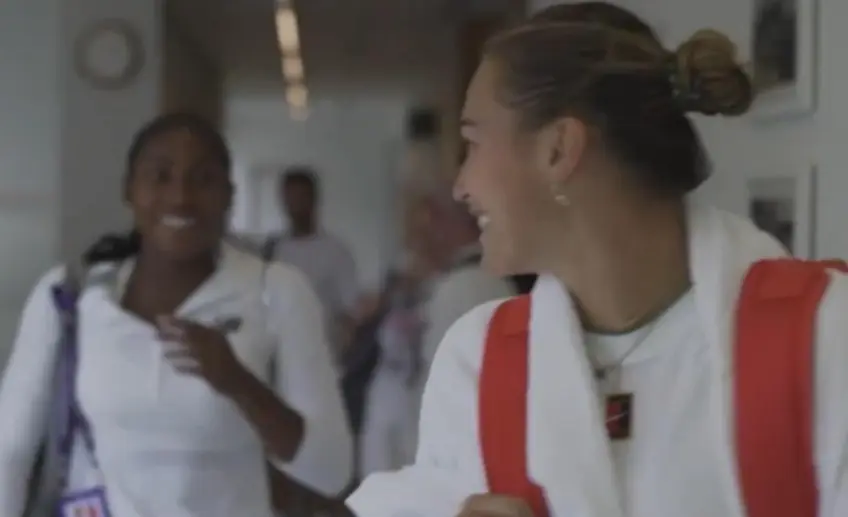Aryna Sabalenka
🚨 JUST IN — Aryna Sabalenka Confronts Coco Gauff With Surprising Question: “Are We Still Friends?” — American Superstar Finally Breaks Her Silence as Reports Claim That…

🚨 JUST IN — Aryna Sabalenka Confronts Coco Gauff With Surprising Question: “Are We Still Friends?” — American Superstar Finally Breaks Her Silence as Reports Claim That…
In a moment that stunned the tennis world and sent shockwaves through the locker room, Aryna Sabalenka reportedly confronted fellow WTA superstar Coco Gauff with a direct and emotionally charged question:
> “Are we still friends?”
The confrontation, which occurred behind the scenes after a tense tournament exit for both players, marks a dramatic twist in what was once considered one of the closest friendships on tour. According to multiple sources inside the WTA circuit, the relationship between Sabalenka and Gauff has been under mounting pressure in recent months, fueled by competitive tension, subtle media jabs, and whispers of locker room drama.
—
🎾 The Confrontation: A Question That Shook the Locker Room
Insiders close to the situation claim that Sabalenka approached Gauff privately but firmly, following a match day that had left both athletes emotionally drained. While the exact location remains unconfirmed, sources suggest it took place in the players’ lounge of a major Grand Slam event, likely in the wake of a heated match that involved controversial line calls and passive-aggressive remarks during post-match interviews.
Sabalenka, known for her explosive playing style and outspoken nature, allegedly caught Gauff off guard by cutting straight to the heart of the issue:
> “We used to talk about everything. But now… are we still friends?”
Those nearby described a heavy silence, with Gauff visibly shocked and hesitant. It was the first time their increasingly cold dynamic had been addressed so openly — and tensions were palpable.
—
🤐 Coco Breaks Her Silence
After days of speculation, Coco Gauff finally addressed the situation in a short but revealing social media post:
> “Some things are bigger than tennis. I’ve always admired Aryna and I still do. But sometimes people grow… and friendships shift. That’s life.”
The message, posted to her Instagram Stories, instantly sparked a media firestorm, with fans and journalists dissecting every word for hidden meaning. While not confirming a full-blown falling out, Gauff’s statement hinted at emotional distance, and seemed to leave the door open to reconciliation — but also closure.
—
😲 What Sparked the Fallout?
According to reports from Tennis Today and WTA Insider, the once-tight bond between Gauff and Sabalenka began to fracture after the 2023 US Open, where both players were among the favorites but found themselves on a collision course. What started as friendly competition reportedly spiraled into subtle on-court mind games and media-fueled rivalry.
Sources inside their camps cite several moments that may have contributed to the rift:
🎤 A post-match interview where Sabalenka appeared to downplay Gauff’s strategy, calling it “predictable.”
📱 Unfollowing incidents on social media, noted by fans and picked up by sports gossip accounts.
🧊 Increasingly icy interactions during pre-match warmups and practice sessions.
While neither player has publicly admitted to a full fallout, the shift in body language has been impossible to ignore. Where there was once laughter and warm hugs, now there’s cool nods and minimal conversation.
—
👯 A Friendship That Captivated Fans
For years, Sabalenka and Gauff were seen as symbols of sportsmanship and female solidarity, often spotted joking during practice sessions or supporting each other from the stands. Their unlikely friendship — between the fiery Belarusian and the calm, focused American — was celebrated across the tennis community.
They were often photographed together at events, sharing laughs, locker room banter, and even training tips. In interviews, both spoke glowingly of the other. Sabalenka once said:
> “Coco is like a little sister to me. We push each other, but off the court, we’re just two girls trying to figure it all out.”
Which makes the recent fallout all the more painful — and captivating.
—
📉 WTA Reactions: “We Didn’t See This Coming”
Several WTA players have commented on the sudden distance between the two stars. One unnamed top-10 player was quoted saying:
> “It’s sad. They were like twins on tour. We all looked up to their bond. Whatever happened, I hope they figure it out.”
Others, however, hinted that competition changes everything:
> “When you’re both fighting for the same titles, friendships get complicated.”
Some fans suspect that endorsement deals, ranking pressure, and personal priorities may have also contributed to the emotional gap.
—
👀 What Happens Now?
As the tennis calendar barrels toward the next Grand Slam, all eyes will be on Sabalenka and Gauff to see how — or if — they interact again. Will they meet in a high-stakes match? Will they share another icy handshake at the net? Or will they eventually bury the hatchet and reignite the friendship fans once adored?
According to one insider:
> “The ball is in Gauff’s court now. Sabalenka made the first move by confronting the truth. Whether this is closure or a new beginning depends on what Coco does next.”
—
🎭 Conclusion: A Drama Bigger Than the Court
As reports continue to flood in, one thing is certain: the emotional confrontation between Aryna Sabalenka and Coco Gauff has unveiled a powerful truth — that even at the highest levels of professional sport, friendship is fragile, complex, and deeply human.
Whether this story ends in reconciliation or respectful distance, fans will be watching — and hoping — for a resolution that honors the history these two champions once shared.
As reports claim that the silence has only just begun to crack… more may be revealed in the days to come.
-

 Liverpool News6 months ago
Liverpool News6 months ago“He Spoke To Me”: Trent Alexander-Arnold breaks Silence on Real Madrid Snub and Finally Reveal The Reason Why He’s Staying at Liverpool After an Advice From….
-

 Liverpool News6 months ago
Liverpool News6 months ago5 Minutes AGO: A Poor Newborn Baby Was Abandoned in a Park Near His Home After The Leicester City Game, in Response To This Heartbreaking Situation, Star Trent Alexander Arnold Stepped In to Become The Child’s Guardian, Pledging To Pay All Living Expenses Until The Child Turns 18….
-

 Liverpool News6 months ago
Liverpool News6 months agoBREAKING NEWS: live from Fabrizio romano, “LET ME GO” Liverpool target set to hand in transfer request to join Liverpool with immediate effect. He said, “I’ve made it clear to the club—I want to leave. The moment I heard Liverpool were interested, my mind was made up. This is a club you don’t say NO to, and I won’t risk waiting around. This is my career, my future, and I’m taking control of it. I’m handing in a transfer request because I want to wear that red shirt. Let me go—this isn’t a request, it’s a warning. My decision is final. It’s Liverpool or nothing.” Yes this is the kind of players we want who want to play for the club and not for the money get him for us immediately the fans are celebrating….
-

 Liverpool News6 months ago
Liverpool News6 months ago“He visited my office yesterday to inform me about his decision to return to the Anfield this summer. I am not only disappointed in him, but I will also report Liverpool to FIFA for attempting to deceive us.” His return to Liverpool by the summer has been confirmed, but a major issue remains unresolved. HAVING NETTED 15 GOALS IN 6 MATCHES THE MONACO COACH IS DISAPPOINTED IN HIM RETURNING TO LIVERPOOL…..
-

 Featured3 months ago
Featured3 months ago🚨𝐄𝐒𝐂𝐋𝐔𝐒𝐈𝐕𝐀: ARDON JASHARI SARÀ UN NUOVO GIOCATORE DEL MILAN! 🚨 ✅ Accordo totale tra Club Brugge e AC Milan per Ardon Jashari! 🔴⚫️ Il trasferimento si chiuderà su una cifra tra i 37 e i 40 milioni di euro, inclusi bonus, oltre a una percentuale sulla futura rivendita. 💼 Contratto fino almeno al 2030, con stipendio stimato tra 2 e 3,5 milioni a stagione 📝 🔥 Ardon Jashari sarà rossonero. Un colpo chiave per il centrocampo del Milan ✅🔴⚫️
-

 Liverpool News6 months ago
Liverpool News6 months agoIT’S FINALLY OFFICIAL:Trent Alexander-Arnold signs a new long-term contract with Liverpool Amid Motivational Goal Scored Against Leicester City, keeping him at the club until 2028….
-

 Featured3 months ago
Featured3 months ago🚨 ULTIM’ORA: CAOS IN SERIE A – La Roma starebbe elaborando un piano terrificante e minaccioso per strappare il difensore brasiliano alla Juventus, ma Tudor ha lanciato un avvertimento chiaro e diretto al club giallorosso, secondo quanto riportano alcune fonti…
-

 Liverpool News6 months ago
Liverpool News6 months agoBREAKING NEWS: Arne Slot Makes Surprise Statement On Trent Alexander-Arnold’s Remaining Games for Liverpool After What Transpired On…
